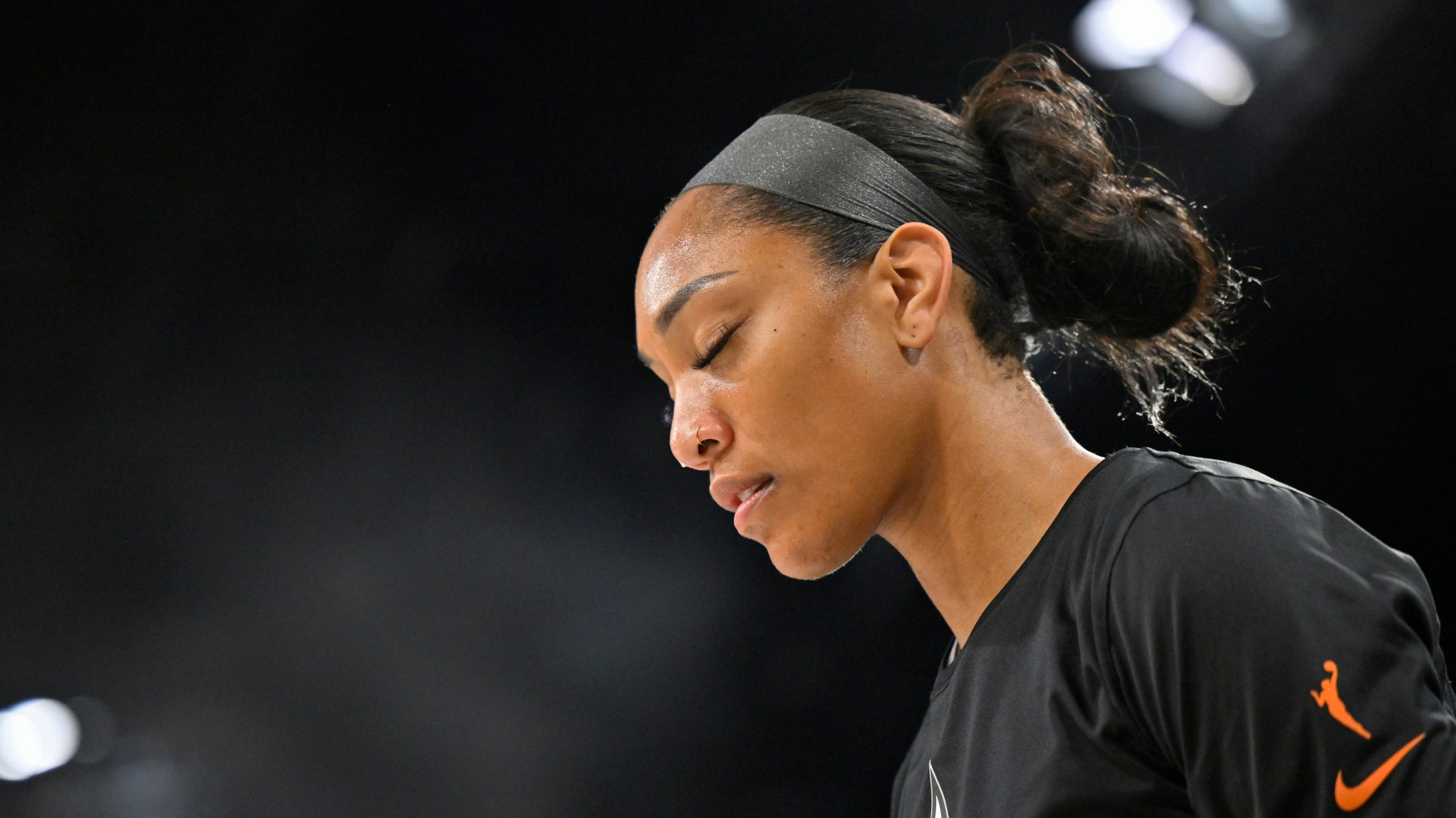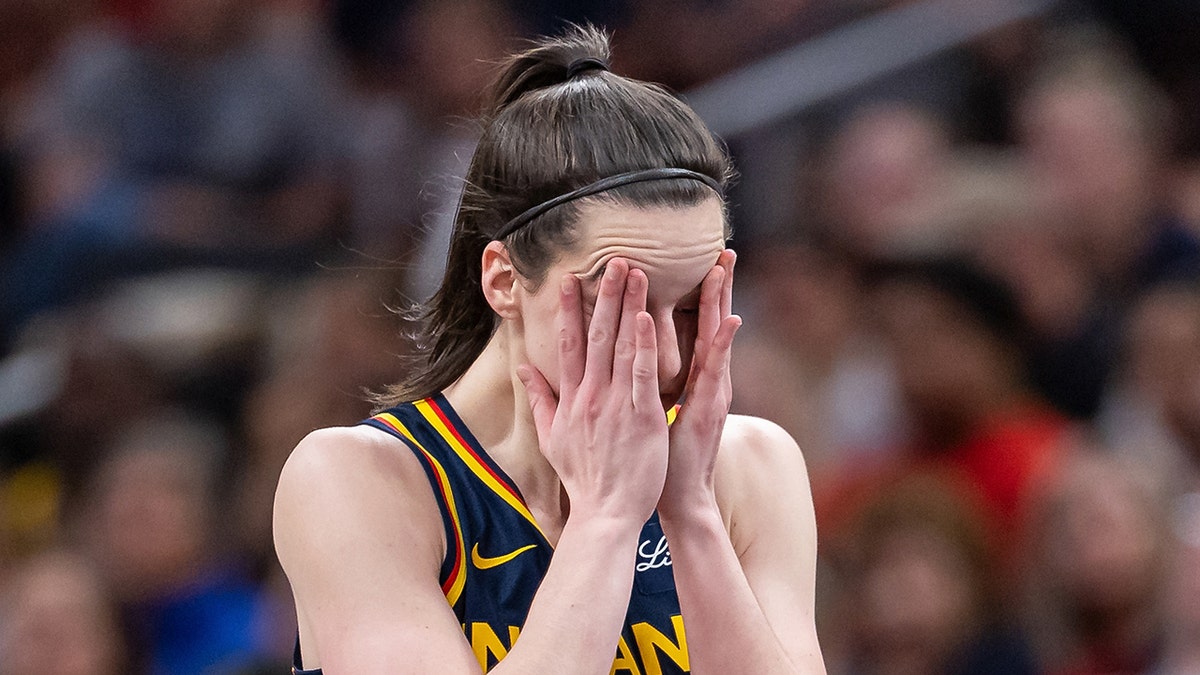In the hyper-charged world of social media, the story was perfect. A’ja Wilson, the WNBA’s dominant MVP, was supposedly so wracked with guilt over her controversial playoff victory against the Indiana Fever that she broke down in a tearful apology, admitting she “messed up.” The narrative spread like wildfire, validating thousands of fans who felt the series had been decided not by players, but by a “special whistle” reserved for the league’s chosen star.
But it was all a lie.

There was no apology. No admission of guilt. In fact, the truth is infinitely more damning. Not only did Wilson not apologize, she did the exact opposite: she complained. In a stunning moment of hypocrisy, the very player accused of benefiting from a season of preferential treatment sarcastically accused an opponent of getting the same “special whistle.”
That fake apology, and the shocking reality that replaced it, has blown the lid off a crisis of credibility that is rocking the WNBA to its core. This is no longer just about one player or a few bad calls. It’s a league-wide firestorm involving furious coaches being fined into silence, a blatant double standard in player protection, and a commissioner who is now openly booed by the fans she’s meant to lead.
The term “A’ja whistle” didn’t materialize out of thin air. It’s a narrative built on a mountain of statistical evidence. In the 2025 season, Wilson, a three-time MVP and undeniable talent, led the entire WNBA in free-throw attempts with 290. Her average of 7.3 attempts per game wasn’t just high; it was more than double the average of rookie phenom Caitlin Clark. This wasn’t an anomaly; Wilson also led the league in free-throw attempts in 2023.

Fans have backed these numbers with endless video compilations: clips allegedly showing dozens of uncalled illegal screens by Wilson, some of which injured opponents, only for the defender to be whistled for a foul.
This simmering frustration boiled over in the WNBA semi-finals between Wilson’s Las Vegas Aces and the Indiana Fever. In a decisive game five, with the score tight, Indiana’s rising star center, Aliyah Boston, was called for a highly controversial loose-ball foul. It was her fifth. She was out of the game. The Aces went on to win in overtime, advancing to the finals. Weeks later, when Boston was shown a replay, her reaction was one of pure disbelief. “Are you kidding me?” she said. “To have a referee make that call at that specific moment… it felt predictable.”
This is the game the internet claimed Wilson apologized for. Instead, here is what actually happened. After the Fever won game four of that same series—a rare game where the whistle heavily favored Indiana (34 free throws to the Aces’ 11)—Wilson and her coach, Becky Hammon, were visibly irritated in the post-game press conference. Hammon called the officiating “shit.”
Then, Wilson delivered the line that has fans seeing red. She sarcastically pointed to Indiana’s Aliyah Boston—the same player who had been fouled out of the previous game—and said, “That’s Aliyah’s special whistle, man.”
It was a stunning act of projection. The player benefiting from a statistically proven “special whistle” was now using the term as a weapon against an opponent, effectively gaslighting everyone who had been questioning the officiating.
The hypocrisy is made even more stark when contrasted with the officiating of Caitlin Clark. As the league’s single biggest draw, Clark has brought millions of new fans and record-breaking ratings to the WNBA. Yet, she is officiated like she’s invisible. Averaging less than half of Wilson’s free throws, Clark is constantly hammered, shoved, and decked on drives to the basket with no call. The double standard is blatant: one star is protected, while the league’s biggest money-maker is apparently fair game.
This isn’t just a fan conspiracy. Coaches are in open revolt. After the game five loss, Fever coach Stephanie White told reporters her team had to “play five on eight,” a clear shot at the three referees. In the finals, Minnesota Lynx coach Cheryl Reeve went nuclear, calling the officiating “malpractice”—a term for professional negligence. She was fined $10,000.

The league’s response has been, in a word, hollow. Commissioner Cathy Engelbert announced a “task force” to review officiating. But at the same time, the league fined both Becky Hammon and Stephanie White simply for agreeing with Reeve’s “malpractice” comment. The message from the top is clear: We will investigate the problem, but we will punish anyone who dares to speak about it publicly.
The rot may go all the way to the top. Engelbert is facing a mutiny. She was booed loudly by the crowd during the finals trophy presentation, and reports have surfaced that multiple team owners want her replaced. In a more explosive allegation, star Napheesa Collier claimed Engelbert told her in a private conversation that Caitlin Clark should be “grateful” for the WNBA platform, feeding the toxic narrative that the league’s old guard resents the rookie’s stardom.
Now, the league is facing a ticking time bomb. The WNBA’s collective bargaining agreement (CBA) expires on October 31, 2025. The players’ union, now armed with indisputable evidence of officiating disparities and a clear lack of protection for its most popular player, has all the leverage. The “A’ja whistle” and the “malpractice” comments are no longer just social media noise; they are Exhibit A in a case for systemic reform.
The fake apology is dead. But in its place, it revealed a real and festering wound. A’ja Wilson is a champion, but her victory tour is now haunted by cries of “Referee Wilson.” The league’s credibility is on the line, and a long-overdue reckoning is finally here.